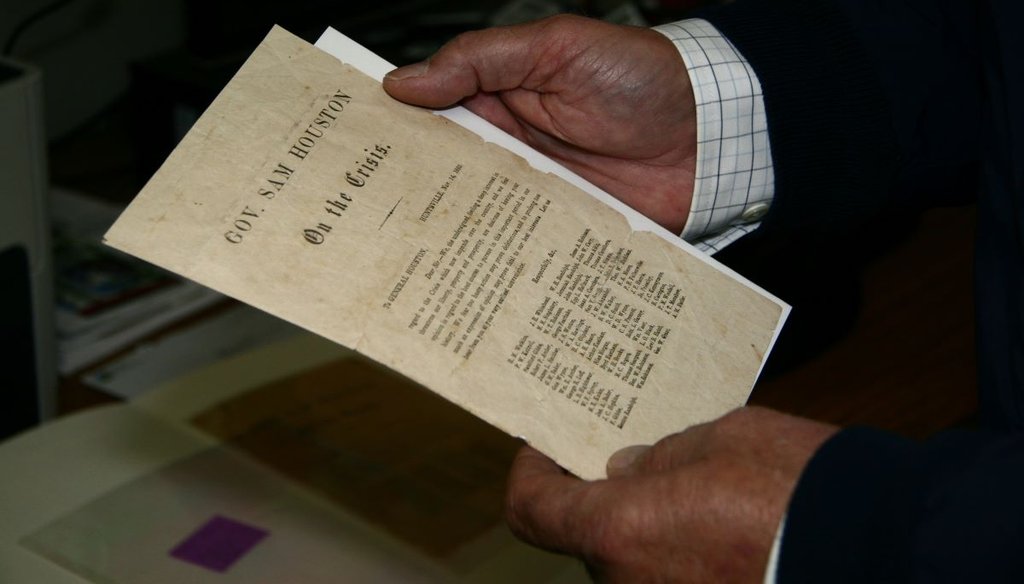Stand up for the facts!
Our only agenda is to publish the truth so you can be an informed participant in democracy.
We need your help.
I would like to contribute

In this Jan. 6, 2011 photo, Mac Woodward, curator of collections at the Sam Houston Memorial Museum in Huntsville, Texas shows a letter Texas Gov. Sam Houston had published in 1860 warning of the perils of the state seceding. (AP)
If Your Time is short
- There are differing legal interpretations on whether a state can secede.
- There is no mention of secession in the U.S. Constitution, so there is no Constitutional right to secede.
- Texas-based expert in government and law said secession may be more of a political question than a legal one.
The Texas Republican Convention on June 18 called for the state Legislature to approve a measure asking voters whether they favor "Texas Independence."
That is, a referendum on secession. The GOP platform committee wrote, "We urge the Texas Legislature to pass (a) bill in its next session requiring a referendum in the 2023 general election for the people of Texas to determine whether or not the State of Texas should reassert its status as an independent nation."
The party also adopted a resolution questioning the 2020 presidential election. In a press release, Republican Party of Texas Chairman Matt Rinaldi said, "Texas Republicans rightly have no faith in the 2020 election results and we don't care how many times the elites tell us we have to." PolitiFact has found claims that the election was "stolen" or "rigged" to be False.
The secession talk also comes as Texas Republicans have been increasingly critical of the Biden administration's immigration policies, among other things.
A referendum on secession could be a litmus test as to whether the idea is a popular one. What lawmakers do next is another question.
Of course, this is not the first time the idea of Texas secession has come up. Could Texas really secede from the union? Let's explore.
PolitiFact Texas reached out to the Texas GOP with follow-up questions regarding this referendum and the platform's note on state sovereignty, but the communications director did not respond.
On state sovereignty, the committee wrote: "Pursuant to Article 1, Section 1, of the Texas Constitution, the federal government has impaired our right of local self-government. Therefore, federally mandated legislation that infringes upon the 10th Amendment rights of Texas should be ignored, opposed, refused, and nullified. Texas retains the right to secede from the United States, and the Texas Legislature should be called upon to pass a referendum consistent thereto."
That 10th Amendment right is states' right to powers that were not assigned to the U.S. by the Constitution.
Meanwhile, that Texas Constitution Section 1, Article 1 addresses state self-governance: "Texas is a free and independent State, subject only to the Constitution of the United States, and the maintenance of our free institutions and the perpetuity of the Union depend upon the preservation of the right of local self-government, unimpaired to all the States."
Jeffrey Kahn, a law professor at Southern Methodist University, observed that the GOP platform does not say where the ‘right to secede’ would come from, and there's no right to secede in the U.S. Constitution.
The U.S. Constitution addresses admitting a state into the Union but not leaving the Union.
Monica Toft, a Tufts University professor of international politics, said that there is no constitutional right to secede and, by that logic, to change the Constitution, and to create such a right would be by amending the Constitution.
Sanford Levinson, a professor of government at the University of Texas School of Law, said whether Texas could secede is more a political question than a legal one. As a legal question, lawyers could have differing interpretations.
"You could get some lawyers to say 'oh no, states simply can't secede under any circumstances," Levinson said. "You could get some lawyers to say, 'Well, you know, actually, the best understanding of the Constitution is that a state could legitimately secede under some circumstances.'"
Texas secession came up as recently as last year when Rep. Kyle Biedermann, R-Fredericksburg, introduced a bill for a referendum to consider whether Texas should become an independent republic.
Former Gov. Rick Perry floated it briefly in 2009, but in 2012 released a statement that he believed in the union. PolitiFact Texas also found characterizations by Perry's opponents about Perry wanting to secede to be False.
Some of the ideology linked to Texas secession stems from Texas' brief history as an independent republic that split off from Mexico. And many would argue that the Civil War resolved whether secession is an option for states.
"The theory for pro-secessionists really lies in the Declaration of Independence, because that's what the Declaration's all about: seceding from the British Empire. And it says, frankly, that whenever the people believe they will be happier by altering and abolishing their government, they have a right to do so," Levinson said.
He noted that was what the Confederate argument for secession included by reading the Constitution in the light of the Declaration, since the Constitution is silent on secession. Unionists obviously disagreed, Levinson said.
Texas sought to secede in 1861 during the Civil War. After the Civil War, the Supreme Court decided in Texas v. White — a case about bonds sold during the Civil War — the union between Texas and the other states was "as complete, as perpetual, and as indissoluble" as the union between the country's first states. The chief justice also wrote that the "perpetuity and indissolubility of the Union" does not imply a loss of states' "distinct and individual existence, or of the right of self-government."
"The Supreme Court in Texas v. White said Lincoln was right. But frankly that is literally the one and only decision that's really on point," Levinson said.
Levinson said the call for a referendum in 2023 begs the question what Texans would realistically vote for, whether the Texas government would try to secede based on a referendum, and also what the rest of the country would do.
"It's one thing for an extreme wing of one of the political parties to vet and pass this resolution," Levinson said. "It would be entirely different, first of all, if there were in fact a statewide vote, and then secondly if the vote said 'yes, let's secede' that the Texas government would then say, 'okay, we're going to declare a secession.'"
Darrell West, vice president and director of governance studies at the Brookings Institute, said there are many logistics, such as legal currency, interstate commerce, visa requirements, military forces, national defense, and border security to consider. And if Congress or the Supreme Court deemed secession illegal, how would they enforce that and keep a state from seceding?
"Right now, Texas is upset with various national policies," West wrote in an email. "But what happens if Republicans recapture Congress in 2022 and the White House in 2024? Would Texas still want to leave if conservatives are in charge in Washington? I doubt it. Changing political control in D.C. likely will be sufficient to keep Texas in the United States."
Our Sources
Texas GOP, "Report of the Permanent 2022 Platform & Resolutions Committee"
Texas Democrats (@texasdemocrats), June 20, 2022
U.S. Congress, Article IV Section 3, Clause 1
Email response from Jeffrey Kahn, professor of law at Southern Methodist University, June 21, 2022
Phone interview with Sanford V. Levinson, professor of Government at the University of Texas at Austin School of Law, June 21, 2022
Phone interview with Zachary Elkins, associate professor at the University of Texas at Austin College of Liberal Arts Department of Government, Jun 21, 2022
Oyez, "Texas v. White"
Cornell Law School, "Texas v. White et al."
Texas Legislature Online, HB 1359
U.S. Congress, Constitution Annotated: 10th Amendment
Library of Congress, "Civil War Glass Negatives and Related Prints"
William G. Gale and Darrell M. West, Brookings Institute, "How seriously should we take talk of US state secession?", Dec. 13, 2021
William G. Gale and Darrell M. West, Brookings Institute, "Is the US headed for another Civil War?", Sept. 16, 2021
Email from Darrell West, vice president and director of governance studies at Brookings Institute, June 22, 2022
U.S. Supreme Court, Texas v. White 1869
Catalina Camia, USA Today, "Gov. Perry doesn't want Texas to secede," Nov. 13, 2012
Chuck Lindell, Austin American-Statesman, "Texas secession petition takes off," Nov. 13, 2012
Phone interview with Monica Toft, professor of international politics and director of the Center for Strategic Studies at Tufts University, June 22, 2022
United States Senate, "Amending the Constitution"



































